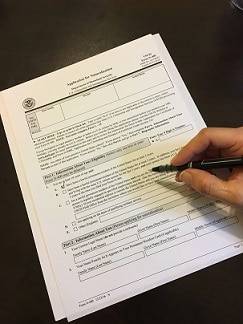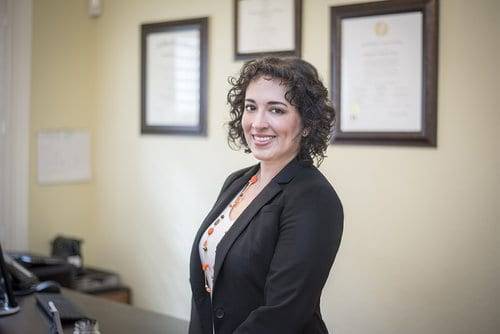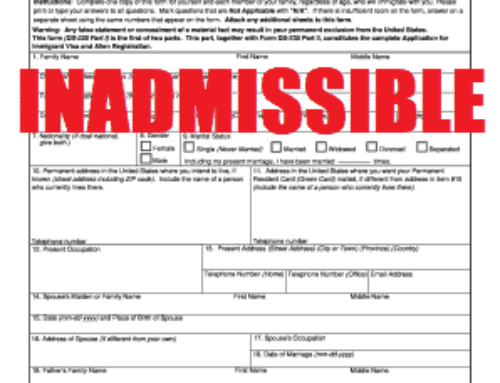TOP 5 MISTAKES PEOPLE MAKE WHEN FILING FOR U.S. CITIZENSHIP
I recently posted a blog about the top mistakes people make filing for their Legal Permanent Residence (LPR) to get their green card. As I was writing it, I kept thinking about how many similar mistakes I see in cases for people filing their citizenship applications and decided I would also need to write a blog about this topic.
Just like with the process of applying for a green card, you are not required to hire an attorney to file your application to U.S. Citizenship and Immigration Services (USCIS) for you. However, just like the green card process, people often make errors in their filings that can end up hurting their application, and also affect FUTURE applications should they need to reapply. Read below to find out the top 5 most common issues I see come up when people try to file on their own:

- They file thinking they only need to know enough English to pass the exam. After you file an application for citizenship, you are scheduled for an exam and interview with your local USCIS office. While people spend plenty of time studying the 100 questions to prepare for the exam, they do not realize that they also have to “pass” the interview portion of the meeting as well. An applicant must demonstrate a good grasp of the English language and this is evaluated in part by how well you are able to hold a conversation about the information on your application with the reviewing USCIS officer. There are limited exceptions to this requirement, but in general, anyone under the age of 50 and who has been an LPR less than 20 years is required to pass the English portion of the interview to be recommended for citizenship.
- They file without having sufficient presence in the United States. Even if you’ve been a green card holder for more than the required 5 years, if you’ve done a lot of traveling or lived outside of the country for any amount of time, you may not yet qualify to apply for citizenship. The requirements state that you must have at least 5 years as an LPR (3 if you are married to a U.S. citizen) AND actual physical presence in the U.S. for at least half of that time. If you spent any amount of time outside of the country as an LPR, make sure you add up all of the days of your absence to make sure that you meet the physical presence requirement.
- They don’t include/update information about changes in their family. This tends to happen a lot with clients who have been LPR’s for several years or more. A lot of life changes can occur between the time you get your green card and the time you are ready to apply for citizenship. When you apply for citizenship, all of those changes need to be disclosed and you must present the evidence to go with it. Information and documents regarding any children you’ve had, step-children who have come into your life, divorces, new marriages, etc. must be presented with your application. Some former clients seem to have been under the impression that this was not necessary or that somehow U.S. immigration would already have that information available to them anyway. Leaving any of this information out can result in delays in making a final decision on your case or even lead to denial.
- They file too soon after a criminal case. My general advice is that anyone with any criminal history at all should always have their case evaluated by an attorney before applying for an immigration benefit to make sure that they qualify and are not at risk of being placed in deportation proceedings. This advice holds true with a citizenship application as well. You do not have to have a squeaky clean criminal history to qualify for citizenship, but many criminal cases will prevent your from qualifying for a period of 5 years from the date of the criminal incident. If you apply too soon, your case will be denied and you’ll have to apply again at the appropriate time, which means completing a new application package with another filing fee.
- They are not prepared for the interview or complete the application incorrectly and end up accused of “fraud”. This may be the mistake I see most often and it can be difficult to overcome. The majority of people who end up in this situation did not actually commit fraud, but through a misunderstanding of how to answer certain questions, what information must be provided, and what is expected of them during the interview, a USCIS officer becomes convinced that the applicant is trying to hide information or mislead them about some detail about their life. An accusation of “misrepresentation” or “fraud” in your record means that your application will be denied and you are prevented from being eligible for citizenship for 5 years. You will also be expected to state on your new application that you have previously committed fraud or made a misrepresentation.
While some mistakes in filings can be fixed to avoid denial, a majority of those errors will lead to needing additional filings, more fees, longer processing times, or even court proceedings. The fact is that most all of the issues above, and others like them, are completely preventable if you have an experienced attorney assisting you with your application from the beginning
View immigration attorney San Antonio in a full screen map
ARE YOU OR SOMEONE YOU KNOW THINKING ABOUT FILING AN APPLICATION FOR U.S. CITIZENSHIP? TALK TO AN EXPERIENCED ATTORNEY TO DISCUSS YOUR SITUATION AND HELP YOU FILE YOUR CASE WITHOUT ALL OF THE RISKS OF FILING ALONE. CONTACT MY OFFICE TODAY AT (210) 320-5633 TO SET UP A CONSULTATION AND GET A PROFESSIONAL ASSESSMENT OF YOUR CASE.
Elizabeth Francine Echavarria was born and raised on the Texas-Mexico border in Del Rio, Texas. She graduated from Del Rio High School in 1996. She completed her undergraduate career at the University of Texas at Austin and graduated in December 1999 with a Bachelor’s Degree in Journalism. After working for four years in the financial industry with Charles Schwab, she decided to pursue her law degree and enrolled in law school at St. Mary’s University in San Antonio, Texas. During her time in law school, she worked with Texas Rio Grande Legal Aid and the Bexar County Battered Women’s Shelter. Elizabeth graduated from St. Mary’s Law School in May 2007 with a Juris Doctorate and was licensed to practice in November that same year.
Elizabeth began her legal career as a prosecutor for the Bexar County District Attorney’s Office in 2008, where she worked until 2010. Since then, she has focused her practice on immigration law, primarily in the areas of legalization, citizenship, and work visas. During her career she has also been involved in pro-bono events to encourage and assist lawful permanent residents to become U.S. citizens. She is a member of the American Immigration Lawyers Association and licensed to practice in the United States District Court of the Western District of Texas. She has been a guest presenter for various events, including the Bexar County Paralegal’s Association and Boerne Bar Association to provide information on current issues and changes to immigration law in the United States. Elizabeth is a compassionate and dedicated attorney who loves her work helping the immigrant community and their families. See Profile Here
Also Elizabeth Francine Echavarria speaks fluent spanish


